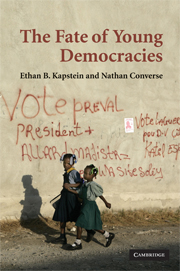Book contents
- Frontmatter
- Contents
- List of Figures and Tables
- Preface and Acknowledgments
- 1 What Makes Young Democracies Different?
- 2 Why Do Young Democracies Fail?
- 3 Are Some Regions More Democracy Friendly?
- 4 Is Democracy Promotion Effective?
- 5 Conclusions and Policy Recommendations
- Appendix 1 Methodology
- Appendix 2 List of Young Democracies
- References
- Index
5 - Conclusions and Policy Recommendations
Published online by Cambridge University Press: 05 June 2012
- Frontmatter
- Contents
- List of Figures and Tables
- Preface and Acknowledgments
- 1 What Makes Young Democracies Different?
- 2 Why Do Young Democracies Fail?
- 3 Are Some Regions More Democracy Friendly?
- 4 Is Democracy Promotion Effective?
- 5 Conclusions and Policy Recommendations
- Appendix 1 Methodology
- Appendix 2 List of Young Democracies
- References
- Index
Summary
There is no easy walk to freedom…
Nelson Mandela, September 21, 1953 (Mandela 2002)FEW CHALLENGES ARE MORE CRUCIAL TO POLICY-MAKERS during this first part of the twenty-first century than ensuring the consolidation and survival of the world's youngest democratic states. The advance of liberal democracy to places yet untouched would mean increasing civil liberties and opportunities for literally millions of people, coupled with much brighter prospects for advancing global commerce and international peace. Conversely, the costs of democratic failure could prove difficult to contain, as authoritarian solutions to political and economic problems gather currency. It is because the stakes are so high that today's foreign assistance programs have made democratization a “core priority” (Carothers 1999), and in fact the public rhetoric in this case has been matched to some extent with increased funding – and even, for better or worse, military action.
To be sure, in only a very few places will foreign assistance and intervention make the decisive contribution that determines the fate of a young democracy (and we recall that many scholars consider foreign aid, as a general rule, to be detrimental to political and economic development). If a democracy is to establish and consolidate itself, it will mainly be due to local conditions on the ground coupled with good institutional arrangements and the policy choices made by elected leaders.
- Type
- Chapter
- Information
- The Fate of Young Democracies , pp. 141 - 156Publisher: Cambridge University PressPrint publication year: 2008



